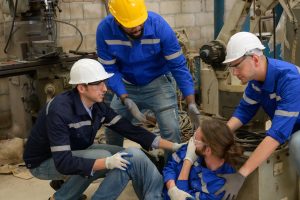Which Witnesses Can You Call in a Workers’ Compensation Appeal?

If the insurance company has wrongfully denied your workers’ compensation claim, you can and should fight back in an appeal. The Riverside workers’ compensation lawyers at Heiting & Irwin, APLC can help you build a case for your appeal.
One of the best ways to prove a case is through the use of witness testimony from unbiased and objective people. There are several categories of witnesses who may be helpful to your case that your workers’ compensation lawyer may call at a hearing in front of an administrative law judge. Your workers’ compensation lawyer will review your case to determine where witness testimony may be the most effective.
Call Heiting & Irwin for help with your workers’ compensation case. We can assist you in complex claims, negotiate settlements on your behalf, or represent you if you need to appeal a denial of your claim. Richard H. Irwin has been a state certified Workers’ Compensation Specialist for well over 20 years.
You Have the Burden to Prove Your Workers’ Compensation Claim
If your workers’ compensation claim has been denied, you would be forced to take the insurance company to the Workers’ Compensation Appeals Board if you want benefits. You may need to prove that you suffered a work-related injury, and the extent of that injury, for an administrative law judge to grant you benefits. Much of your case depends on the testimony that you or your witnesses could offer. Your workers’ compensation attorney may call several witnesses on your behalf to testify. Here are some types of witnesses who may be helpful for your workers’ compensation appeal.
Your Fellow Co-Workers
A key question in any workers’ compensation case is whether your injury was work-related. Your employer may claim that your injuries did not happen during the course of your work. They could argue that you were hurt during a break or during lunch or that you were hurt someplace else, or not hurt at all. Alternatively, your employer may argue that your injury resulted from intentional misconduct (you may still be entitled to benefits even if you were negligent yourself).
Your co-workers may provide factual testimony that would give some context to the events surrounding your accident. And it is against the law for your employer to retaliate against you for filing a claim. They also cannot discipline an employee who gives supportive testimony in a workers’ compensation appeal. Your fellow workers may be hesitant to testify on your behalf, but the Workers’ Compensation attorneys at Heiting & Irwin can protect them and assure decent treatment and lower any risk of backlash.
Medical Expert Witnesses
The insurance company may have denied your claim because they claim that you have not suffered an injury, or that your injury was not work-related. You may be suffering from a condition that is subjective (no outward signs) in nature, and the insurance company is claiming that you are still able to work.
Medical experts may be required (on our side too) to testify about the nature, cause, and extent of your injuries, and how they keep you from working. They will connect the injury to your job and describe how your employment duties, or what you were exposed to in the workplace caused your medical condition
Safety Experts
Your employer may claim that you acted intentionally and caused your own injury. They could also argue that you deliberately failed to use the proper safety equipment. Both of these allegations could put your workers’ compensation benefits (at least some of them) at risk. You would have to defend yourself against these allegations. Your workers’ compensation lawyer will put on your case and may work with an expert witness with a background in safety to demonstrate that you did not do anything wrong. Even then, your own negligence is not a definite bar to receiving workers’ compensation benefits.
Vocational Experts
The insurance company may claim that you are still able to perform your job, notwithstanding your injury. You may need a physiatrist, a doctor, or a vocational expert to testify about what work you can and cannot do with your injury. Your expert witness may need to testify that the doctor who said that you are able to come back to work is wrong. They may also testify about what duties you might be able to perform if you have been called back to work, as well as any work restrictions that should be in place.
Your workers’ compensation attorney will review your case to determine which witnesses could be helpful to your case. The attorneys will put great effort into presenting the strongest possible case on your behalf, so you can establish your entitlement to workers’ compensation benefits.
Contact a Riverside Workers’ Compensation Attorney Today
Call Heiting & Irwin to get help from an experienced California workers’ compensation attorney who can be your advocate and guide to the system. We provide you with vigorous legal representation to help you get the best possible outcome for your case. To speak with a workers’ compensation lawyer in Riverside, you can call us today at 951-682-6400. Especially if your claim has been denied, you need to act quickly.
